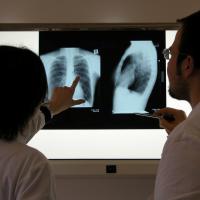mHealth—The New Medical Best Practice

Mobile health will be a routine medical best practice within five years. That’s the goal, according to Federal Communications Commission chairman Julius Genachowski, who announced the FCC is putting muscle behind the government’s mobile health or mHealth push.
In June 2012, the FCC gathered industry leaders to discuss ways to accelerate adoption of mobile health care technologies. Participants then formed the mHealth Task Force to develop recommendations for ways that industry and government can use mobile devices—mobile phones, tablets, and other electronic devices—to improve health outcomes and lower costs.
At a recent event at the Information Technology and Innovation Foundation (ITIF), a US non-profit public policy think-tank headquartered in Washington DC, the mHealth Task Force released its report outlining recommendations to accelerate the adoption of mHealth technologies.
Among the actions the FCC recommends:
- Wireless health test beds: Streamline the FCC’s experimental licensing rules to encourage the creation of wireless health device “test beds” to permit easier testing of mHealth technologies.
- Health care broadband networks: Update the Rural Health Care (RHC) program to include rules to permit networks of hospital and health care facilities to jointly apply for RHC program funds to boost broadband capacity and enable electronic health records.
- International MBAN spectrum: The FCC’s International Bureau will work with FCC counterparts in other countries to encourage them to make spectrum available for Medical Body Area Networks (MBANs) and to discuss possible spectrum harmonization efforts to allow for medically safe cross-border patient travel and better economies of scale for device makers.
- Health Care Director: Search for a permanent FCC Health Care Director to function as the central point of contact to external groups on all health-related issues.
Mobile health technology innovations are already being announced. Chairman Genachowski provided several examples, saying: “Just this month, researchers at Stanford unveiled a tiny new pacemaker so small it could fit on the head of a pin. Instead of using batteries for power, the pacemaker is charged by a wireless transmitter from outside the body, avoiding the need for battery packs that require surgery to replace. Earlier this year, those same researchers developed a medical sensor so tiny it could float through a patient’s blood vessels, powered by the patient’s own pulse.”
The FCC’s actions to enable mobile health are welcomed by many, and if mhealth is standard medical practice within five years, everyone will benefit.
“Hats off to the FCC!” said David Collins, senior director, mHIMSS, the global mobile initiative of the Healthcare Information and Management Systems Society (HIMSS) in a blog post about the FCC’s mHealth Task Force Findings and Recommendations. “This is an incredibly quick turnaround with well thought out recommendations, in which the FCC boiled down key items as priorities, but did not attempt to ‘boil the ocean’.”

